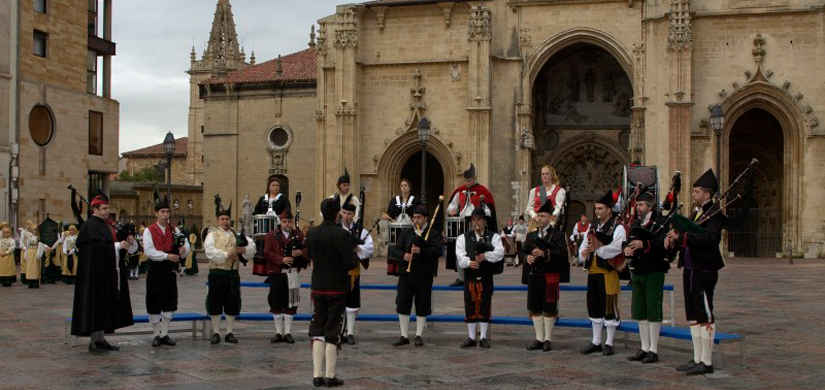You are in:
- Area of Communication and Media |
- Other News
Start of main content
Princess of Asturias Awards 10/23/2009
Sixteen bagpipe maestros performed “la Alborada de los Premios Príncipe de Asturias” (the Dawn of the Prince of Asturias Awards)

©FPA
The performance was be the first of the events held on Friday 23rd and took place at 10,00 a.m. outside the Cathedral of Oviedo
Sixteen bagpipe maestros gathered to perform Alborada de los Premios Príncipe de Asturias (Dawn of the Prince of Asturias Awards) for the first time. The piece was written by Asturian bagpiper Xuacu Amieva. The musicians that took part in this event were music conservatory professors, ensemble conductors, teachers in schools of traditional music, soloists and winners of international awards. Bagpipers from different ensembles carried a parade that went through the most representative streets in Oviedo.
The official opening of Xuacu Amieva’s musical composition, written expressly for the Prince of Asturias Foundation, was presided by T.R.H. the Prince and Princes of Asturias last October at the Reconquista Hotel in Oviedo. The “Alborada de los Premios Príncipe de Astuias" (Dawn of the Prince of Asturias Awards) was inspired by the concert “Best Bagpipers in the World” which brought together six renowned soloists from the international folk scene in July 2008.
The piece lasts six minutes and was performed by bagpipes in B-flat (tombal) and percussion instruments like the high tension drum, kettledrum and bass drum.
Xuacu Amieva is one of the most outstanding figures of traditional Asturian music. He is a professor of Asturian bagpipe and Folk music ensemble at the International Music School of the Prince of Asturias Foundation. His long musical career as a bagpiper, teacher of bagpipers and multi-instrumentalist in a number of folk groups has earned him a reputation in Asturias and beyond. His repertoire covers a wide range of traditional Asturian songs and melodies, written not only for bagpipes but also for the traditional rabel (three-stringed Spanish violin), the hurdy-gurdy, the flute or to be sung.
He has been involved since 1975 in ethnographic research work and has also been active in work to disseminate folk music with groups such as Raigañu, Urogallos and others. He began teaching the bagpipe in Oviedo in 1980, and has since expanded this facet of his work to other parts of Asturias. In 1984, he published the first Asturian bagpipe method, co-authoring the book with Francisco Ortega. The Oviedo Bagpipe School was the seedbed in 1987 of the Narancu Bagpipe Band, which he has since been musical director of. He was one of the founders of the folk groups Beleño (1983) and Ubiña (1985), which he played in until the band split up in 1989. He has taken part in many traditional music festivals as a member of these groups and as a solo performer both in Asturias and elsewhere in Spain and Europe.
He continued to pursue his career from 1990 onwards as a soloist and with the Xuacu Amieva Folk ensemble. He has worked with the Principality of Asturias Production Company, writing the soundtrack to some of their documentaries. In 1992, he wrote the script for a documentary called Asturian Musical Instruments. He is the composer of the original soundtrack for the short films Xicu el toperu and Mitos Astures and has played the three-stringed violin and sung with The Chieftains on a song from their album Santiago. One of his concerns is popularising traditional Asturian music so he works in different schools organising seminars and concerts for a range of traditional instruments (bagpipe, traditional three-stringed Spanish violin, hurdy-gurdy, flutes, percussion and voice). Since 1995, he has taken part in the Mercau Astur, writing the music for its Cuentu Mitolóxicu. His awards include the Macallan Trophy at the Lorient Celtic Festival in 1986, and a 1997 Grammy Award for the song el Besu on the Chieftain's album, Santiago. His discography includes the following: Método de gaita, 1984; Onde l´agua ñaz, 1986; Ubiña, 1988; Xostrando, 1989; Lluna caldeá, 1992; La gaita asturiana, 1993; Tiempo de Mitos. Resistencia, 1999; Al son del fueu, 2003. He has also published the following books: Método de gaita, 1994; Método de gaita asturiana, 1998, and La gaita asturiana, 2003.
End of main content
Sección de utilidades
Fin de la sección de utilidades
- Legal document Legal document (Access key 8)
- | Privacy policy Privacy policy (Access key )
- | Social networks ???en.portal.pie.menu107.title???
- | Cookies ???en.portal.pie.menu110.title???
- | Site map Site Map (Access key 3)
- | Contact Contact (Access key )
- | XHTML 1.0
- | CSS 2.1
- | WAI 'AA
© Copyright 2024. FUNDACIÓN PRINCESA DE ASTURIAS





